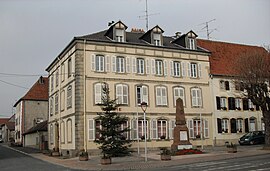|
Lixheim
Lixheim is a commune of France in the northeastern Moselle department of Grand Est, a kilometre southeast of another commune, Vieux-Lixheim. HistoryThe first Lixheim (now Vieux-Lixheim) was founded by a Benedictine priory in the 12th century. The new town was founded by Count Palatine George Gustavus in 1608 to replace Phalsbourg, which his father Count Palatine George John I had had to cede. In their small principality of the county of Lutzelstein (La Petite-Pierre), the Counts Palatine wanted to create fortified towns capable of accommodating their Reformed co-religionists, who had been expelled from the Duchy of Lorraine.[3] Nevertheless, Lixheim was sold to the Duke of Lorraine in 1623; despite his commitment to freedom of Protestant worship, Duke Henry II The Good did little to resist the pressures that drove many of the Reformed inhabitants into exodus.[4] In 1629–1660, Lixheim and Phalsbourg formed the short-lived principality of Phalsbourg and Lixheim, for the benefit of Henriette de Lorraine and her three successive husbands, including Louis de Guise. The princess had coins minted in Lixheim.[3] On the death of the princess, the principality's territories reverted to the Duchy of Lorraine. Duke Leopold observed in his own way the tolerance promised by Henry II: the Reformed were allowed to worship in the neighboring county of Nassau-Sarrewerden (Alsace bossue), a modest but commendable concession from a sovereign whose House had always fiercely defended Catholicism.[3] See alsoReferences
External links
|
||||||||||||||||||||||||||||||||||||||||||||||




